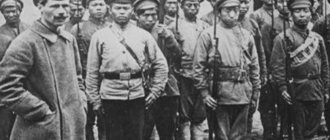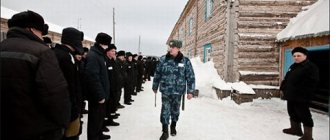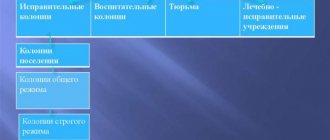Article 104. Working conditions for those sentenced to imprisonment
Article 104. Working conditions for those sentenced to imprisonment
[Criminal Executive Code] [Special Part] [Section IV] [Chapter 14]
. The length of working hours for those sentenced to imprisonment, the rules of labor protection, safety precautions and industrial sanitation are established in accordance with the labor legislation of the Russian Federation. The start and end times of work (shifts) are determined by shift schedules established by the administration of the correctional institution in agreement with the administration of the enterprise where the convicts work.
. Taking into account the nature of the work performed by convicts held in correctional institutions and prisons, cumulative recording of working time is allowed.
. The time convicts are involved in paid work is counted towards their total length of service. The accounting of time worked is assigned to the administration of the correctional institution and is carried out based on the results of the calendar year. If a convicted person systematically evades work, the corresponding period of time is excluded by decision of the administration of the correctional institution from his total work experience. The decision of the administration of the correctional institution can be appealed by the convicted person in court.
. Working convicts have the right to annual paid leave: lasting 18 working days - for those serving imprisonment in educational colonies; 12 working days - for those serving imprisonment in other correctional institutions. The specified leaves are granted with or without travel outside the correctional institution in accordance with Article 97 of this Code. The time spent by a convicted person in a cell-type premises, single cell-type premises and solitary confinement does not count towards the period required for the provision of annual paid leave.
. Convicts who exceed production standards or exemplarily fulfill established tasks in heavy work, as well as in work with harmful or dangerous working conditions, in enterprises located in the regions of the Far North and equivalent areas, or convicts working at will, who are disabled first or of the second group, for convicted persons who have reached the age giving the right to receive an old-age insurance pension in accordance with the legislation of the Russian Federation, the duration of annual paid leave can be increased to 18 working days, and for convicted minors - up to 24 working days.
Article 173. Termination of serving a sentence and procedure for release
Article 173. Termination of serving a sentence and procedure for release
[Criminal Executive Code] [Special part] [Section VI] [Chapter 21]
1. Serving deprivation of the right to hold certain positions or engage in certain activities, compulsory labor, correctional labor, restriction of freedom, forced labor, arrest, imprisonment for a certain period , as well as serving restrictions on military service and detention in a disciplinary military unit are terminated on the last day of the sentence, taking into account those changes that can be made to the term of punishment in accordance with the law.
2. Those sentenced to forced labor, arrest and imprisonment for a certain period of time are released in the first half of the last day of the sentence. If the sentence ends on a weekend or holiday, the convicted person is released from serving the sentence on the day before the weekend or holiday. When calculating the term of punishment in months, it expires on the corresponding date of the last month, and if a given month does not have a corresponding date, on the last day of that month.
3. Upon release, the convicted person is given things and valuables belonging to him, funds stored in his personal account, personal documents and securities, as well as documents on the release of the convicted person from punishment and documents on his work activity.
4. The passport of a person released from forced labor, arrest or imprisonment, his work book and pension certificate, stored in the personal file of the convicted person, are issued to him upon release. If there is no passport, work book or pension certificate in the prisoner’s personal file, as well as if the passport has expired, the administration of the correctional institution takes measures in advance to obtain them. If it is necessary to obtain a new passport, the costs associated with its issuance are deducted from the funds in the personal account of the convicted person. If the convicted person does not have funds in his personal account, the costs associated with the issuance of a new passport are paid at the expense of the state.
5. Early release from serving a sentence is carried out on the day of receipt of the relevant court decision, court ruling, act of pardon or a decision approved in the established manner to apply an amnesty act to the convicted person, and if the specified documents are received after the end of the working day - in the morning of the next day ( unless otherwise provided by acts of pardon or amnesty). If the received court decision has not entered into legal force and has not been appealed, release from serving the sentence is made on the morning of the day following the day of expiration of the period for appealing the said decision in cassation procedure.
6. On the day of the end of the term of correctional labor, and in the event of release from this punishment on other grounds - no later than the next working day after receiving the relevant documents, the penal inspection is obliged to propose to the administration of the organization in which the convicted person served correctional labor to stop deductions from his wages . The released person is issued a document confirming the completion of the sentence or release from it.
7. A convicted person released from serving a sentence due to the reversal of a sentence in connection with the termination of a criminal case is explained by the head of the institution or body executing the sentence his rights to the restoration of property, labor, housing and other rights lost while serving the sentence. In the release document, an official apology is made to the said convict on behalf of the state.
Article 174 of the Penal Code of the Russian Federation. Release of convicted military personnel from serving their sentences
- Convicted military personnel serving a restriction on military service, arrest or detention in a disciplinary military unit are exempt from further serving their sentence in the event of an illness that makes them unfit for military service. The unserved part of the sentence may be replaced by a more lenient punishment.
- Convicted military personnel serving a sentence during military service, in the event of other grounds for dismissal from military service provided for by the legislation of the Russian Federation, may, in accordance with the established procedure, be early released by the court from punishment with the replacement of the unserved part of the punishment with a more lenient type of punishment or without it.
Article 107 of the Penal Code of the Russian Federation. Deductions from wages and other income of persons sentenced to imprisonment
- Deductions are made from the wages, pensions and other income of those sentenced to imprisonment to reimburse the costs of their maintenance in accordance with part four of Article 99 of this Code.
- Reimbursement by convicted persons of expenses for their maintenance is made after satisfying all claims of collectors in the manner established by Federal Law of October 2, 2007 N 229-FZ “On Enforcement Proceedings”.
- In correctional institutions, regardless of all deductions, at least 25 percent of their accrued wages, pensions or other income is credited to the personal account of convicts, and to the personal account of convicted men over 60 years of age, convicted women over 55 years of age, convicts who are disabled people of the first or second group , convicted minors, convicted pregnant women, convicted women with children in children's homes of a correctional institution - at least 50 percent of their accrued wages, pensions or other income.
Article 178 of the Penal Code of the Russian Federation. Monitoring compliance with the terms of deferment of serving a sentence
- If a convicted person, to whom a deferred sentence has been applied, evades raising and caring for a child, the penitentiary inspectorate issues a warning.
- If the convict has abandoned the child or continues, after an announced warning, to evade raising and caring for the child, the penal inspection at the place of his residence submits to the court a proposal to cancel the deferment of serving the sentence and to send the convict to serve the sentence imposed by the court verdict. . A copy of the court ruling on deferment of serving the sentence is attached to the submission.
- A convicted person is considered to be evading raising a child if he, without officially abandoning the child, left him in a maternity hospital or transferred him to an orphanage, or leads an antisocial lifestyle and does not raise and care for the child, or left the child to relatives or other persons, either disappeared or commits other actions indicating evasion from raising the child.
- When a child reaches fourteen years of age or in the event of the death of a child, the criminal-executive inspection at the place of residence of the convicted person, taking into account the nature and degree of social danger of the crime committed, the behavior of the convicted person, his attitude towards raising the child, the terms of the sentence served and not served, sends to the court a proposal for the release of the convicted person from serving the sentence or the remaining part of the sentence or to replace the remaining unserved part of the sentence with a more lenient type of punishment.
- If the convicted person complies with the terms of deferment of serving the sentence and its correction, the criminal-executive inspection submits to the court a proposal to reduce the period of deferment of serving the sentence and to release the convicted person from serving the sentence or the remaining part of the sentence with the criminal record expunged. In this case, the said submission cannot be made before the expiration of a period equal to the term of the sentence, the serving of which was suspended.
The State Duma introduced amendments to the Criminal Code and the Code of Criminal Procedure on the specifics of parole release
The Russian government today submitted to the State Duma a draft federal law clarifying the conditions for parole from prison, according to the chamber's materials.
Bill No. 571703-5 “On Amendments to Article 173 of the Criminal Executive Code of the Russian Federation and the Criminal Procedure Code of the Russian Federation,” in particular, eliminates the ambiguous interpretation of the rules of the Penal Code of the Russian Federation. Thus, in accordance with part five of Article 173 of the Penal Code, early release from serving a sentence is carried out on the day the relevant documents are received, and if the documents are received after the end of the working day - in the morning of the next day. At the same time, the Penal Code does not indicate whether the court decision received by the institution executing punishments should enter into legal force.
According to part one of Article 391 of the Criminal Procedure Code, a ruling or ruling of a court of first instance or appellate instance comes into force and is enforced after the expiration of the period for appealing it in cassation or on the day the ruling of the cassation court is issued.
“At the same time,” note the developers of the bill, “in practice, there are cases when the institution executing punishment receives a court decision that has not entered into legal force.” In this case, with a literal understanding of the provisions of the current version of part five of Article 173 of the Penal Code, such a decision is subject to execution.
To eliminate this conflict, the draft proposes to enshrine the following in the provisions of the Penal Code: “Early release from serving a sentence is carried out on the day of receipt of the relevant court decision or ruling, act of pardon or duly approved decision to apply an amnesty act to the convicted person, and in case of receipt of the specified documents after the end of the working day - in the morning of the next day (unless otherwise provided in the acts of pardon or amnesty).” Moreover, if the received court decision has not entered into legal force and has not been appealed, release from serving the sentence is made on the morning of the day following the day of expiration of the period for appealing it in cassation.
In addition, in Article 401 of the Criminal Procedure Code of the Russian Federation, the bill proposes to provide that when submitting a proposal to a court decision, according to which the convicted person is subject to release from serving a sentence, the prosecutor notifies in writing the administration of the place where the sentence is served before the expiration of the period for appealing it in the cassation court. ok.
The bill also proposes, in part five of Article 388 of the Code of Criminal Procedure, to stipulate that a copy of the cassation ruling or an extract from the operative part of the cassation ruling, according to which the convicted person is subject to release from serving the sentence, is immediately sent to the administration of the place of serving the sentence for execution in accordance with Article 173 of the Penal Code. “This provision is intended to ensure timely notification of the administration about the facts of the courts issuing relevant judicial acts and the immediate release of convicts,” the developers explain.
- Penal system
- State Duma of the Russian Federation, Government of Russia
- Penal Code of the Russian Federation, Code of Criminal Procedure of the Russian Federation
- Grant of parole
AZ-libr.ru
Article 104. Working conditions for persons sentenced to imprisonment 1. The length of working hours for persons sentenced to imprisonment, the rules of labor protection, safety precautions and industrial sanitation are established in accordance with the labor legislation of the Russian Federation. The start and end times of work (shifts) are determined by shift schedules established by the administration of the correctional institution in agreement with the administration of the enterprise where the convicts work. 2. Taking into account the nature of the work performed by convicts held in correctional institutions and prisons, cumulative recording of working time is allowed. 3. The time when convicted persons are involved in paid work is counted towards their total length of service. The accounting of time worked is assigned to the administration of the correctional institution and is carried out based on the results of the calendar year. If a convicted person systematically evades work, the corresponding period of time is excluded by decision of the administration of the correctional institution from his total work experience. The decision of the administration of the correctional institution can be appealed by the convicted person in court. 4. Working convicts have the right to annual paid leave: lasting 18 working days - for those serving imprisonment in educational colonies; 12 working days - for those serving imprisonment in other correctional institutions. These vacations are granted with or without travel outside the correctional institution in accordance with Article 97 of this Code. The time spent by a convicted person in a cell-type premises, single cell-type premises and solitary confinement does not count towards the period required for the provision of annual paid leave. 5. Convicts who exceed production standards or exemplarily fulfill established tasks in heavy work, as well as in work with harmful or dangerous working conditions, in enterprises located in the regions of the Far North and equivalent areas, or convicts who work at will and are disabled of the first or second group, for convicted men over 60 years of age and convicted women over 55 years of age, the duration of annual paid leave can be increased to 18 working days, and for convicted minors - up to 24 working days.Comm. Geranin V.V.
1. An important role in the perception of socially useful labor by convicts as a means of correction is played by its maximum proximity to the working conditions of all citizens of the state. This requirement is enshrined in Article 7 of the International Covenant on Economic, Social and Cultural Rights and is repeatedly emphasized in the labor section of the Standard Minimum Rules for the Treatment of Prisoners. 2. A feature of the legal regulation of labor relations of convicts is that they are regulated by the norms of both labor and penal legislation. In Part 1 of Article 104 of the Penal Code of the Russian Federation, the legislator specifically indicates that part of the labor relationship that is regulated by labor legislation. In accordance with Art. 91, 92 of the Labor Code of the Russian Federation, the normal working hours cannot exceed 40 hours per week, and for a number of categories of workers the working week is reduced: for minors under the age of 16 years - up to 24 hours, for working disabled people of groups I and II - up to 35 hours, for minors aged 16 to 18 years - up to 36 hours, for those working in harmful or dangerous working conditions - up to 36 hours or more. For convicted minors studying in educational institutions, working hours are reduced by half. Convicts are fully subject to the provisions of the conventions of the International Labor Organization ratified by the Russian Federation, the Federal Laws of 1999 “On the Fundamentals of Labor Safety in the Russian Federation” and 1999 “On the Sanitary and Epidemiological Welfare of the Population.” 3. The start and end times of work are determined by the administration of the correctional institution, which, taking into account the nature of the work performed by convicts, can summarize the recording of working hours so that the duration of working time for the accounting period (month, quarter, etc.) does not exceed the normal number of working hours. 4. Convicts lose the right to benefits associated with continuous work experience. However, they retain the right to include the time of paid work during the period of serving a sentence in the total length of service, which is important for the assignment of a pension, as well as taking into account their work and insurance experience in accordance with the Federal Laws of 2001 “On Labor Pensions”, 2001. “On state pension provision in the Russian Federation” and 2001 “On compulsory pension insurance in the Russian Federation”. The administration of the correctional institution keeps track of the time worked based on the results of the calendar year. The convicted person, against receipt, is familiarized monthly with the time counted toward his or her total length of service. If a convicted person systematically evades or refuses to perform work assignments (at least twice a month) or is absent from the workplace for unexcused reasons for three consecutive hours per shift, this period (month or day) is excluded by decision of the administration of the correctional institution from its total work experience. In case of disagreement with such a decision, the convicted person may appeal it to the court. The document confirming the time of work of a convicted person in places of deprivation of liberty is a work book, and in its absence, a certificate issued by a correctional institution. The calculation of time worked is carried out in accordance with the instructions “On the procedure for recording the work time of convicts during the period of serving a sentence of imprisonment, counted towards the total length of service,” announced by order of the GUIN of the Ministry of Justice of Russia No. 261 (2001). 5. Working convicts, like all citizens, are provided with annual paid leave. However, its duration is not 28 working days, as provided for in Article 115 of the Labor Code of the Russian Federation, but 12 working days for convicts serving sentences in correctional colonies and prisons, and 18 working days for convicts held in educational colonies. Moreover, the time during which the convicted person served a disciplinary sanction in a cell-type room, single cell-type room or solitary confinement is not counted towards the period required for granting leave (Part 4 of Article 104 of the Penal Code of the Russian Federation). Leave is granted to all working convicts, but the possibility of taking it with or without leaving the correctional institution is determined by the administration in accordance with Article 97 of the Penal Code and Section VIII of the Penitentiary Institution. Convicts who are not granted leave spend their vacation in premises specially created for these purposes, located on the territory of correctional institutions and differing from ordinary dormitories in more comfortable conditions and a different daily routine. If convicts exceed production standards (working piecework) or fulfill established tasks in an exemplary manner (working part-time), working: 1) in heavy work; 2) at work with harmful or dangerous working conditions (see the resolution of the State Committee for Labor of the USSR and the Presidium of the All-Union Central Council of Trade Unions of 1974 “On approval of the list of industries, workshops, professions and positions with harmful working conditions, work in which gives the right to additional leave and a shortened working day ”; 3) at enterprises located in the regions of the Far North and equivalent areas (see RF Law of 1993 “On state guarantees and compensation for persons working and living in the Far North and equivalent areas”; 4) at their own request (disabled people of groups I and II and old-age pensioners), the duration of their vacation can be increased to 18, and in educational colonies - up to 24 working days. 6. The length of work of convicted persons at night is reduced by one hour. Night time, according to Article 96 of the Labor Code of the Russian Federation, is from 22:00 to 6:00. The duration of weekly uninterrupted rest cannot be less than 42 hours.




